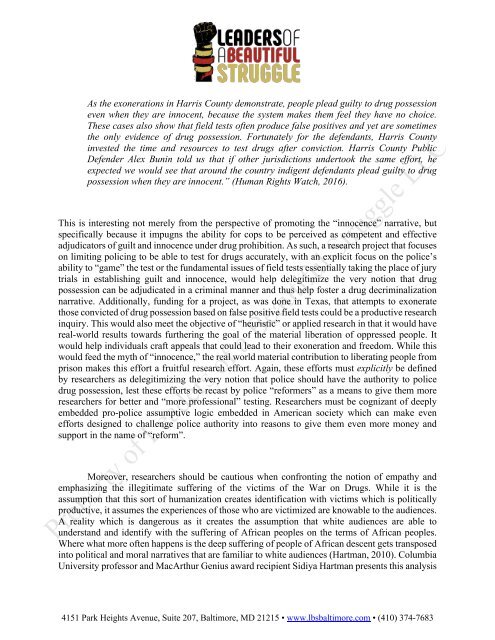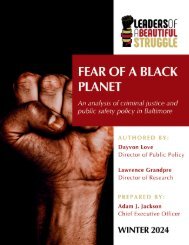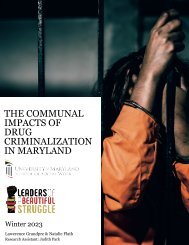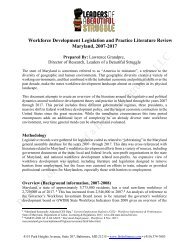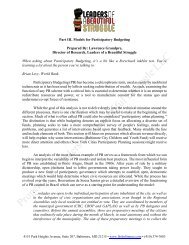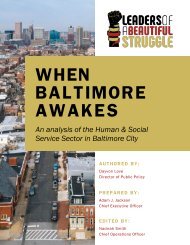Drug Decriminalization in Maryland Through an African Centered Research Paradigm- Analysis and Recommendations
This document offers guidance for theorizing questions related to a proposed research project purposed to advance drug decriminalization in Maryland.
This document offers guidance for theorizing questions related to a proposed research project purposed to advance drug decriminalization in Maryland.
- No tags were found...
Create successful ePaper yourself
Turn your PDF publications into a flip-book with our unique Google optimized e-Paper software.
As the exonerations <strong>in</strong> Harris County demonstrate, people plead guilty to drug possession<br />
even when they are <strong>in</strong>nocent, because the system makes them feel they have no choice.<br />
These cases also show that field tests often produce false positives <strong>an</strong>d yet are sometimes<br />
the only evidence of drug possession. Fortunately for the defend<strong>an</strong>ts, Harris County<br />
<strong>in</strong>vested the time <strong>an</strong>d resources to test drugs after conviction. Harris County Public<br />
Defender Alex Bun<strong>in</strong> told us that if other jurisdictions undertook the same effort, he<br />
expected we would see that around the country <strong>in</strong>digent defend<strong>an</strong>ts plead guilty to drug<br />
possession when they are <strong>in</strong>nocent.” (Hum<strong>an</strong> Rights Watch, 2016).<br />
This is <strong>in</strong>terest<strong>in</strong>g not merely from the perspective of promot<strong>in</strong>g the “<strong>in</strong>nocence” narrative, but<br />
specifically because it impugns the ability for cops to be perceived as competent <strong>an</strong>d effective<br />
adjudicators of guilt <strong>an</strong>d <strong>in</strong>nocence under drug prohibition. As such, a research project that focuses<br />
on limit<strong>in</strong>g polic<strong>in</strong>g to be able to test for drugs accurately, with <strong>an</strong> explicit focus on the police’s<br />
ability to “game” the test or the fundamental issues of field tests essentially tak<strong>in</strong>g the place of jury<br />
trials <strong>in</strong> establish<strong>in</strong>g guilt <strong>an</strong>d <strong>in</strong>nocence, would help delegitimize the very notion that drug<br />
possession c<strong>an</strong> be adjudicated <strong>in</strong> a crim<strong>in</strong>al m<strong>an</strong>ner <strong>an</strong>d thus help foster a drug decrim<strong>in</strong>alization<br />
narrative. Additionally, fund<strong>in</strong>g for a project, as was done <strong>in</strong> Texas, that attempts to exonerate<br />
those convicted of drug possession based on false positive field tests could be a productive research<br />
<strong>in</strong>quiry. This would also meet the objective of “heuristic” or applied research <strong>in</strong> that it would have<br />
real-world results towards further<strong>in</strong>g the goal of the material liberation of oppressed people. It<br />
would help <strong>in</strong>dividuals craft appeals that could lead to their exoneration <strong>an</strong>d freedom. While this<br />
would feed the myth of “<strong>in</strong>nocence,” the real world material contribution to liberat<strong>in</strong>g people from<br />
prison makes this effort a fruitful research effort. Aga<strong>in</strong>, these efforts must explicitly be def<strong>in</strong>ed<br />
by researchers as delegitimiz<strong>in</strong>g the very notion that police should have the authority to police<br />
drug possession, lest these efforts be recast by police “reformers” as a me<strong>an</strong>s to give them more<br />
researchers for better <strong>an</strong>d “more professional” test<strong>in</strong>g. <strong>Research</strong>ers must be cogniz<strong>an</strong>t of deeply<br />
embedded pro-police assumptive logic embedded <strong>in</strong> Americ<strong>an</strong> society which c<strong>an</strong> make even<br />
efforts designed to challenge police authority <strong>in</strong>to reasons to give them even more money <strong>an</strong>d<br />
support <strong>in</strong> the name of “reform”.<br />
Moreover, researchers should be cautious when confront<strong>in</strong>g the notion of empathy <strong>an</strong>d<br />
emphasiz<strong>in</strong>g the illegitimate suffer<strong>in</strong>g of the victims of the War on <strong>Drug</strong>s. While it is the<br />
assumption that this sort of hum<strong>an</strong>ization creates identification with victims which is politically<br />
productive, it assumes the experiences of those who are victimized are knowable to the audiences.<br />
A reality which is d<strong>an</strong>gerous as it creates the assumption that white audiences are able to<br />
underst<strong>an</strong>d <strong>an</strong>d identify with the suffer<strong>in</strong>g of Afric<strong>an</strong> peoples on the terms of Afric<strong>an</strong> peoples.<br />
Where what more often happens is the deep suffer<strong>in</strong>g of people of Afric<strong>an</strong> descent gets tr<strong>an</strong>sposed<br />
<strong>in</strong>to political <strong>an</strong>d moral narratives that are familiar to white audiences (Hartm<strong>an</strong>, 2010). Columbia<br />
University professor <strong>an</strong>d MacArthur Genius award recipient Sidiya Hartm<strong>an</strong> presents this <strong>an</strong>alysis<br />
4151 Park Heights Avenue, Suite 207, Baltimore, MD 21215 • www.lbsbaltimore.com • (410) 374-7683


